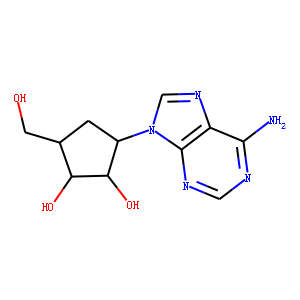| Reference | <span style="font-family:arial,helvetica,sans-serif;"><span style="font-size:12px;"><span style="color: rgb(51, 51, 51); font-variant-ligatures: normal; orphans: 2; widows: 2;">1. Bennett, L.L. Jr., et al. Mol. Pharmacol. 4, 208, (1968) 2. Bindu, G.V., J. Org. Chem., 51 (8), pp 1287–1293, (1986) 3. Kusaka, T, The Journal of Antibiotics, Vol.21 , No.4, 255-263, (1968)<br />
2.</span> Eur J Pharmacol. 2017 Oct 5;812:138-146. doi: 10.1016/j.ejphar.2017.07.023. Epub </span></span>
<div>
<span style="font-family:arial,helvetica,sans-serif;"><span style="font-size:12px;">2017 Jul 10.Aristeromycin and DZNeP cause growth inhibition of prostate cancer via induction of mir-26a.Uchiyama N(1), Tanaka Y(2), Kawamoto T(2).</span></span></div>
<div>
</div>
<div>
<span style="font-family:arial,helvetica,sans-serif;"><span style="font-size:12px;">Most prostate cancers initially respond to androgen deprivation therapy, but then progress from androgen-dependent to androgen-independent prostate cancers. In the present study, a differential cytotoxicity screen of hormone-resistant prostate cancer LNCaP-hr cells and the parental LNCaP-FGC cells against normal MRC5 fibroblast cells, identified a small molecule compound, Aristeromycin (a derivative of 3-deazaneplanocin A (DZNeP)). The molecular target was shown to be S-adenosylhomocysteine hydrolase (AHCY), which catalyzes reversible hydrolysis of S-adenosylhomocysteine (SAH) to adenosine and L-homocysteine. DZNeP and Aristeromycin showed high inhibitory activity against AHCY. Treatment of the prostate cancer cells with DZNeP led to SAH accumulation and decreased levels of homocysteine and histone H3K27 methylation. SAH accumulation and cell growth inhibition were confirmed after siRNA-mediated AHCY knockdown. To further understand why AHCY inhibitors decreased prostate cancer cell growth, we performed microRNA expression profiling with LNCaP-hr cells. Mir-26a, which is involved in regulation of EZH2 expression, was upregulated in Aristeromycin-treated LNCaP-hr cells. A reporter assay established with the EZH2 3'-UTR confirmed that transfection of microRNA precursor molecules for miR-26a decreased the EZH2 3'-UTR luciferase activity. Meanwhile, an antisense microRNA inhibitor for miR-26a recovered the luciferase activity. The present findings suggest, at least in part, that miR-26a induced by an AHCY inhibitor can </span></span></div>
<div>
<span style="font-family:arial,helvetica,sans-serif;"><span style="font-size:12px;">regulate oncogenic EZH2 expression, and could thus be an important mechanism of action for AHCY inhibitors in the treatment of prostate cancer.</span></span></div>
<div>
</div>
<div>
<span style="font-family:arial,helvetica,sans-serif;"><span style="font-size:12px;">Copyright © 2017 Elsevier B.V. All rights reserved.</span></span></div>
<div>
</div>
<div>
<span style="font-family:arial,helvetica,sans-serif;"><span style="font-size:12px;">DOI: 10.1016/j.ejphar.2017.07.023</span></span></div>
<div>
<span style="font-family:arial,helvetica,sans-serif;"><span style="font-size:12px;">PMID: 28705714 [Indexed for MEDLINE]</span></span></div>
|

